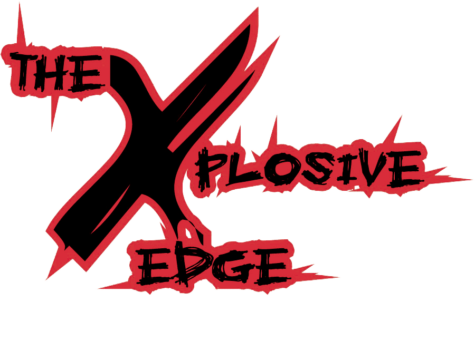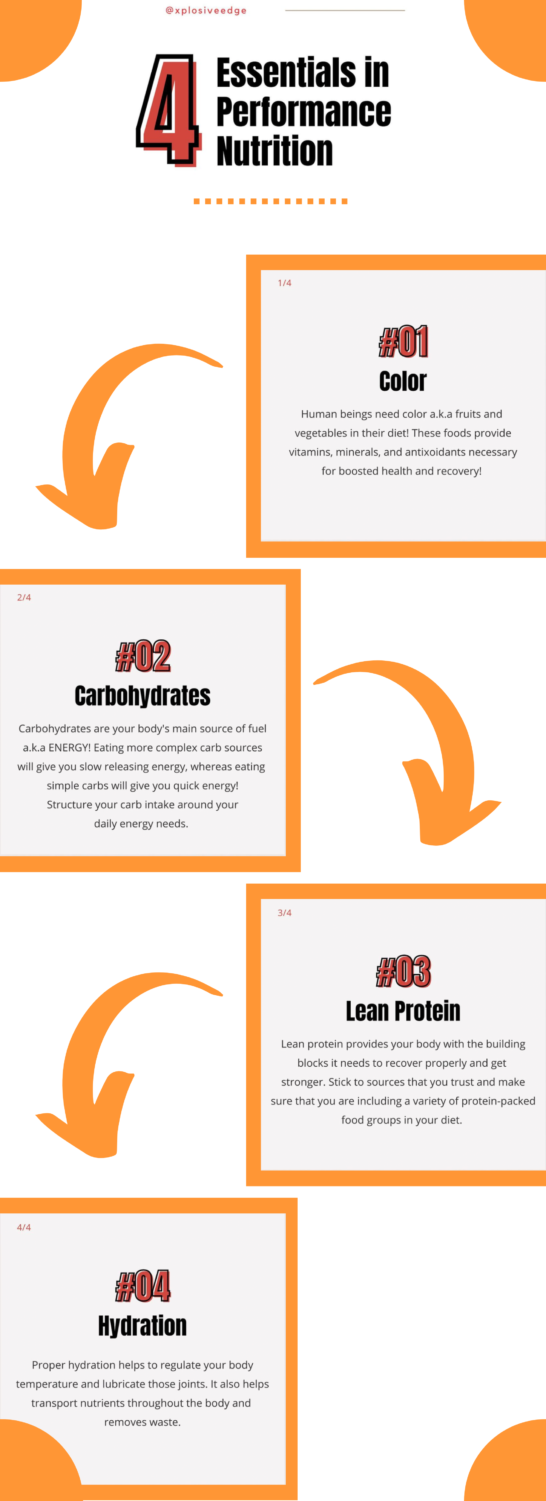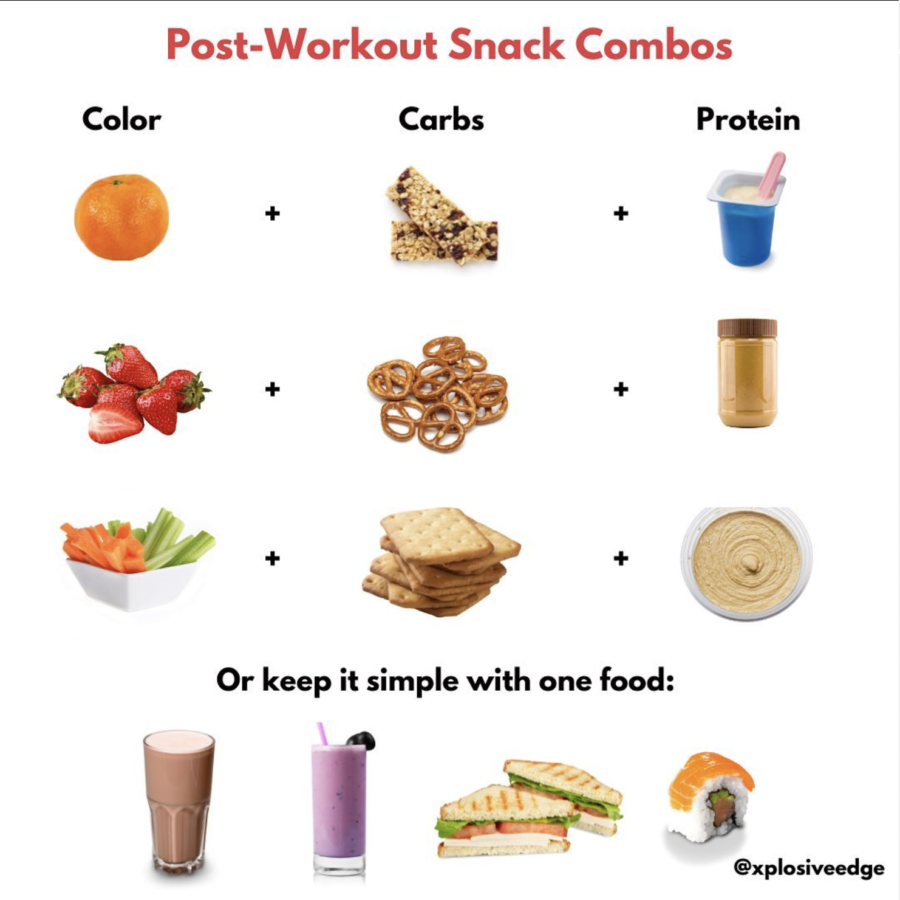AthlEATS
Discovering proper nutrition as a high school athlete
Post-workout snacks are crucial to athlete’s nutrition. Simple combinations like these ensure balance and convenience. GRAPHIC BY XPLOSIVE EDGE
February 24, 2023
I have been doing sports longer than I have been putting food into my own mouth. I started swim lessons at eight months, biking at three, skiing at three and a half, gymnastics at four, soccer at five, golf at six, basketball at seven, softball and tennis at eight, volleyball at 12, cross country and track at 13.
If that paragraph sounds familiar, you might have read my story in the North Star News Magazine last year about my experiences with sports and injuries. This year I am looking at sports from a new angle.
Although I have been dealing with injuries in sports almost since the time I started, serious conversations surrounding food and nutrition started when I entered high school.
Proper fuel is a big deal for any serious athlete. In high school cross country alone, I ran anywhere from three to ten miles every day in the fall, usually with a race or two squeezed in every week. As a multi-sport athlete, I also trained with my soccer club during the same season, three times a week, with games on weekends.
It is no question that people need adequate food and water to perform at the highest caliber. When I was younger I didn’t pay mind to this fact, but transforming into a more serious athlete forced me to face it head-on.
One reason eating became a bigger deal to me in high school was because of the sheer time commitment I had to make to sports. Being surrounded by cross country every day of the week for multiple hours every day, all the intricacies of the sport started to weigh heavier on my mind.
When I felt sick to my stomach or dehydrated during an after-school practice, I started to pay more attention to the food I was putting in my body.
Another detail I started paying more attention to, especially as a girl, was how I looked compared to the other girls I ran alongside.
To me, I did not fit the ideal image of what I thought a runner should look like. Most of the girls lining up next to me at the start lines were taller, slimmer, and more toned than I was.
I subconsciously slipped into the mindset that if I ate less, my legs would start to look longer and skinnier like some of the girls in front of me during races.
To be an athlete and have a successful relationship with food, you need to pay a certain amount of attention to what you put in your body, but not too much.
Soccer and running coaches have always warned against dieting or counting calories. And while I never fell into those gimmicky, highly commercialized traps, I often fell into phases where I neglected to adequately fuel myself in less noticeable ways.
Skipping breakfast before a workout or not eating a balanced meal or snack afterward can be very harmful down the road. In the moment, it might seem reasonable because you are losing weight and looking fitter, but your performance will not pay off in the long run.
It was not until I physically sat down and learned the basics of nutrition that my habits began to change.
Thanks to the Fueling Tactics® nutrition seminar from the athletic performance program Xplosive Edge, I’ve learned lots of helpful tips over the years to make sure I get the right kind– and amount– of food to eat before and after workouts.

The Xplosive Edge is a company founded in Omaha, aimed at helping athletes at all levels increase performance and decrease injury. Aside from speed, agility and Olympic weight training, their programs offer a nutrition seminar for athletes and parents at the beginning of each six- or eight-week session.
Gibbie Duval became a coach at this program in 2005 after it was founded by his father and brother. He is now the Owner and Director of Sports Performance at Xplosive Edge.
Duval grew up in Lincoln, Nebraska, surrounded by sports. Both his father and older brother worked in the University of Nebraska football program under Tom Osborne, so Duval said he essentially “grew up in the weight room.”
He knew he wanted to be a strength and conditioning coach after training under Boyd Eppley, “who’s kind of the godfather of strength and conditioning,” said Duval. Eppley is known both as the most decorated strength coach in history and for his national contribution to the discipline, according to husker.com.
After graduating from UNO in 2004, Duval now holds almost a dozen certifications in coaching, personal training, nutrition and postural restoration.

PHOTO COURTESY OF GIBBIE DUVAL
The Xplosive Edge program for high school athletes aged 13 to 18, called Prep Edge, has been influenced by a camp Duval attended as a high schooler at Lincoln East. The strength and conditioning program at the University of Nebraska, called Husker Power, allowed 100 high school athletes to train with them four days a week for eight weeks. Duval attended every summer.
“It was just awesome because I had great strength and conditioning coaches,” said Duval. “I got to train at Nebraska, at the University, and so that’s when I knew this is what I wanted to be.”
The nutrition program that Xplosive Edge teaches their athletes was authored by Dave Ellis, who started as a performance nutritionist at the University of Nebraska in the 90s and ended his third stint there in November 2022. He had developed this method of eating, called Fueling Tactics®, before the first Food Guide Pyramid was created by the USDA in 1992.
Fueling Tactics® is a three-step model that includes “colorful fruits and vegetables, carbs, and protein,” said Duval. Xplosive Edge has also added “hydration” to their model, which I can attest might be a more necessary reminder for high schoolers than college athletes. This method is now taught to MLB, NFL, NBA, NHL, top college and Olympic athletes across the continent.

This nutrition program has been one of the most beneficial aspects to my athletics since I started high school. Training at Xplosive Edge not only helped me embrace building muscle instead of trying to stay lean, but they helped me do that in a very well-rounded way.
“There’s other places that you can train in Omaha where you just go train, you know, they might do some pre-testing and some post-testing, but not a lot of places incorporate the nutrition aspect of it,” said Duval.
He believes the biggest barrier for high school athletes getting proper nutrition is a lack of planning.
“Nobody’s teaching these kids how to meal prep. They’re living out of fast-food drive-thrus and vending machines,” said Duval.
Another problem is that high schoolers stay up too late, often on their phones, causing them to sleep in often and skip breakfast.
Kids are very active, but the problem is “they’re not eating enough and they’re not eating often enough,” said Duval.
In Duval’s experience, dieting doesn’t work. Diets are too “fickle” and “short term” to be effective. Most diets are also low on carbohydrates which Duval believes are necessary for athletes.
Instead, he builds his meals around the three aspects of Fueling Tactics® in his house with his five daughters.
“I’ve come to the conclusion that [nutrition] has to be a lifestyle, right, you have to do it long term,” said Duval.
In order to instill this mentality in the athletes training at Xplosive Edge, there are a few main points Duval hope athletes take away by the end of it.
- Eat foods that are rich in antioxidants and anti-inflammatories
- Eat five to six times a day
- Choose better snack foods like seeds or nuts
- Learn which types of carbs to eat on active days versus inactive days
- Diversify the protein you eat
“We really want them to leave that nutrition seminar having a better strategy for fueling their bodies pre-workout and post-workout,” said Duval.
Putting good food into your body, at good times and in good amounts, is not just for athletes. Everyone can benefit from having a healthy relationship with food.
I wish at the beginning of high school I had someone to tell me that it was okay for me to build muscle; it was okay if my thighs touched while I ran. Thankfully, I found guidance at Xplosive Edge and from all my supportive coaches in cross country, soccer and track. I will always be grateful for their support.
There are so many aspects of nutrition, hydration and self-care, it is easy to feel overwhelmed. Starting now to build strong foundations for those ideas is better than not starting at all.



